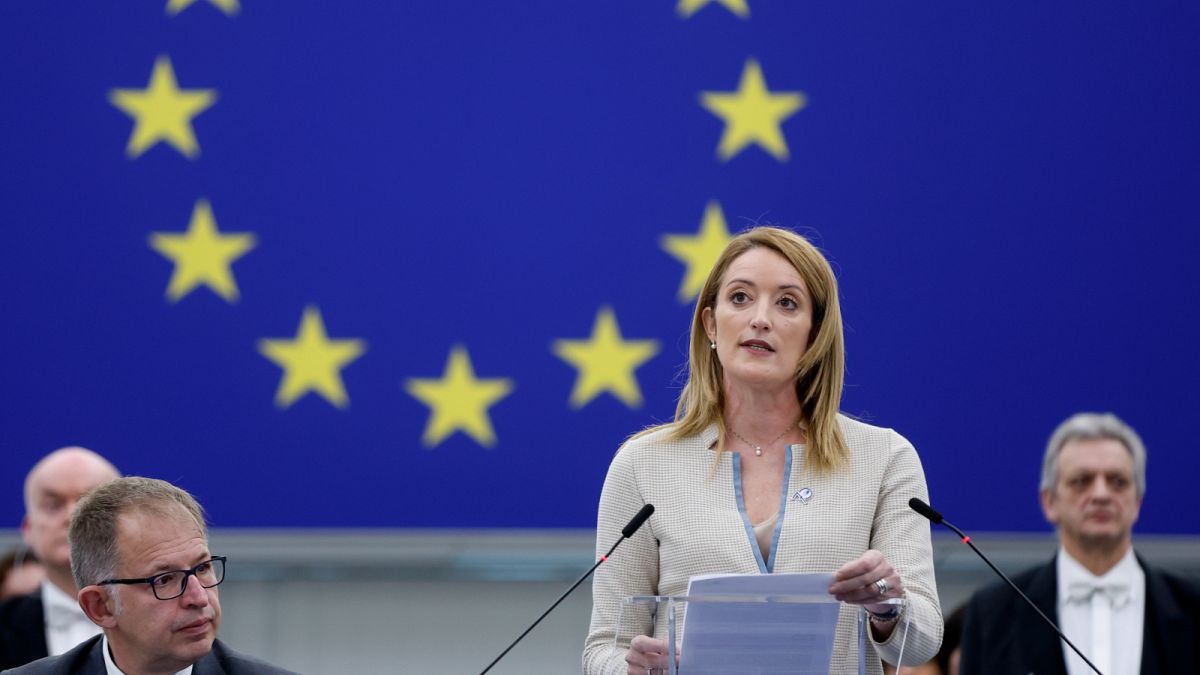The European Parliament declared Russia a "state sponsor of terrorism" this week in a vote overwhelmingly backed by MEPs.
State of the Union is our weekly show from Brussels that brings you the top stories of the week.
There were quite a few memorable moments at the European Parliament meeting in Strasbourg this week.
First, lawmakers celebrated the 70th anniversary of the institution -- "the only directly elected multilingual, multi-party, transnational parliament in the world," as its president Roberta Metsola put it.
She also described the EU's lawmaking body as a "beacon of the defence of democracy".
With that in mind, MEPs got down to business the next day, voting to recognise Russia as a "state sponsor of terrorism", a resolution that was approved overwhelmingly.
Ukraine has been pushing for such a strong statement for quite some time now, with its president, Volodymyr Zelenskyy, reacting strongly.
"Thank you to all parliamentarians. And then Russia proved it to be true by launching 67 missiles at our infrastructure, at our energy sector, at ordinary people," the Ukrainian leader said on Wednesday.
European Parliament cyber-attack
Russia had just been designated a terrorist state, when, just hours later, external access to the website of the European Parliament went down.
Apparently, a Distributed Denial of Service attack, used by hackers to flood networks with high volumes of data that they cannot handle, resulted in a crash of the system.
Metsola declared this to be a sophisticated cyberattack for which a pro-Kremlin group claimed responsibility.
The Russian government then suggested "designating the European Parliament as a sponsor of idiocy".
Apparently, the Russian designation as a state sponsor of terrorism did not go unnoticed.
Former Lithuanian Prime Minister Andrius Kubilius, who drafted the resolution condemning Moscow, told Euronews that he expects Ukraine to win the conflict, despite Russia's efforts.
"I think that Russia will lose the war and they will be defeated and that will open the doors for transformation in Russia," he told Euronews.
"Transformation towards more of a normal type of country, a more European type of country totally abandoning autocracy, totally abandoning post-imperial dreams to restore an empire and that will create possibilities for Russian people to have a normal life back in Russia itself."
EU money slowly slipping away from Orban
Away from the Ukraine conflict, it was revealed on Thursday that the European Commission is likely to recommend that billions of euros in EU funds be withheld from Hungary after judging that Budapest has failed to deliver the reforms necessary to ensure such funds are protected from corruption.
The European Commission's position was reported hours before MEPs overwhelmingly called for EU funds for Hungary to be frozen due to rule of law breaches.
In September, the EU's executive called for an estimated €7.5 billion in European funds to be withheld from Hungary over corruption concerns after it triggered a new rule of law mechanism.
This sum amounts to roughly 65% of the funds Budapest received under EU Cohesion programmes.
The Hungarian government, helmed by hard-right populist Prime Minister Viktor Orban, could get the money if it passed 17 remedial measures negotiated with the Commission before November 19.
These aimed to address "systematic irregularities" in the public procurement process, conflict of interest from government officials and weaknesses in the investigation and prosecution of cases regarding EU funds.
Budapest sent the necessary paperwork by 19 November with Justice Minister Judit Varga describing herself last week as "very optimistic" the funds would be disbursed.
But the European Commission's assessment is that Budapest has not delivered and it has decided to refer the matter to the EU Council.
EU countries are therefore expected to vote on this in mid-December with a qualified majority necessary to block the disbursement.
